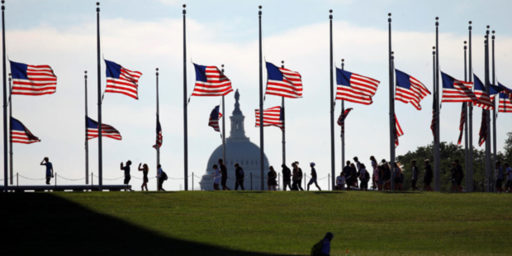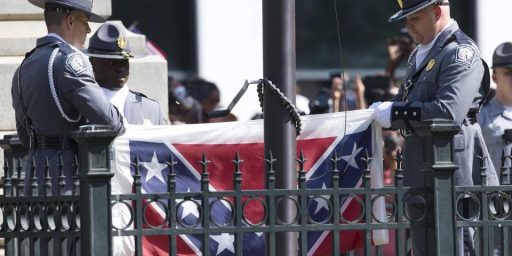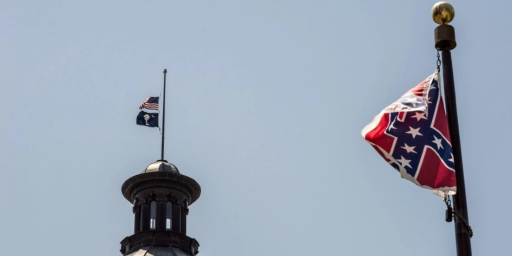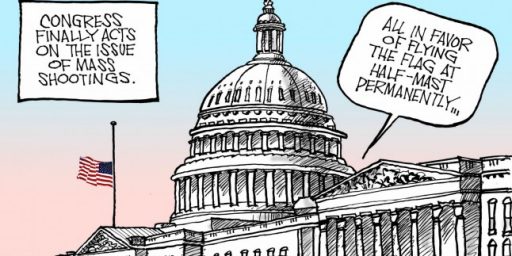Rhode Island Governor Orders Confiscating Guns from ‘Red Flag’ Persons
As with any such discretionary power given to police, it will surely be abused. But the Parkland shooting was yet another in a long line of situations where obvious "red flags" were ignored until it was too late.
YahooNews/GMA (“Rhode Island executive order encourages taking guns from ‘red flag’ individuals“):
Rhode Island established a new “red flag” policy on guns with an executive order that will help keep guns away from people who “could pose significant threats to public safety.”
“The executive order I signed today is an immediate step we can take to make residents safer. It sets the table for a complementary legislative effort,” Gov. Gina Raimondo, a Democrat, said in a statement Monday. “We cannot wait a minute longer for Washington to take action to prevent gun violence.”
Five states — Connecticut, California, Washington, Oregon and Indiana — have taken similar action on potential red flags in recent years, but Rhode Island is the first to do so since the deadly school shooting in Parkland, Florida, earlier this month.
The policy does not give law enforcement new authority to confiscate guns, but it directs them to use “all available legal steps” to remove firearms from people who have shown warning signs, including recently making threats of violence online or in person, according to the statement.
The reporting here is vague, so I’m going to operate under the presumption that the governor is acting within the scope of her legitimate authority. While I’m always dubious of executive exertions that there is no time to waste waiting for the legislative process to work, simply ordering law enforcement officials under her jurisdiction to prioritize enforcement of existing laws in this ambit seems reasonable on its face.
As with any such discretionary power given to police, it will surely be abused. Persons of color and those in lower socio-economic strata will almost inevitably disproportionately targeted. But the Parkland shooting was yet another in a long line of situations where obvious “red flags” were ignored until it was too late.






This part concerns me. Are we talking something as simple as “hey stop physically attacking me or I’ll kick your ass in self defense” or “DEATH TO ALL MUSLIMS!!!”?? A warning could easily be taken out of context as a threat of violence. I haven’t had any luck find any information on this. Anyone got something to help me?
In addition to the executive power issue, I am concerned by any laws that start to impose reporting duties of medical practitioners, especially when it comes to mental health issues.
The stigma in this country against discussing mental illness remains strong, and the people who need help are already reluctant to seek help in many cases due to that stigma. If we start creating the impression that psychiatry is becoming a tool of the state, then people who need help are going to be less likely to seek it out. Additionally, I am concerned about what kinds of mental illness would disqualify someone from exercising their Second Amendment rights. Will it be confined to people who pose obvious risks to themselves or others, or would it be broader than that? What about people who suffer from chronic conditions such as depression and are under treatment that may or may not include medication? Are they to be denied the right to possess a weapon just like the obvious “crazy” people?
I wrote about these issues in the wake of the Gabby Giffords shooting back in 2011. My opinions haven’t really changed since then and I think we need to have serious discussions rather than rushing headlong into a perceived “solution” in the face of an undeniable tragedy
It’s going to be an interesting ride if the police start entering homes to confiscate guns.
@Doug Mataconis: My understanding is that mental health professionals are already required to report actual threats to kill, although this may vary from state to state. And I would guess the NRA is against it.
@MarkedMan:
Yes, but the standards are quite high. Many of the proposals I’ve seen vis a vis changes in the law would seem to make the number of cases in which reporting would be mandatory to be quite larger.
Not sure they were really “ignored” as much as there is little that can be done about them absent a specific concrete threat where you can get a Judge to enter a restraining order.
As Doug notes above, there are major issues with the “mental health” dodge the NRA keeps pushing. Yes, we have major mental health issues in this country but the solution to gun violence isn’t primarily found in stigmatizing those with mental health issues but with reducing the availability of weapons whose only purpose is widespread death.
Similarly, the solution to our schools being targets of gun violence is not to introduce more guns. The solution is to eliminate the types of guns used in mass shootings and the high capacity magazines that make the death counts so high.
Every country has mental health issues. Only the US has regular mass fatality issues.
FWIW, there are many circumstances that allow government officials to take away privileges in advance of damage being done. For instance, if you are driving recklessly, even if not under the influence, there are at least some states where an officer can stop you and perhaps even impound the car if you do not have someone else who can drive you home. I’m pretty certain air traffic controllers have a wide berth in judgement for determining someone should not be granted takeoff rights.
The executive order is here, if you want to read it in full:
http://www.governor.ri.gov/documents/orders/ExecOrder18-01.pdf
@MarkedMan:
Additionally, it will be interesting to see how this plays out across the state. Some areas of RI are relatively rural and skew pretty Red (not unlike areas here in Western NY). I suspect that law enforcement in these areas are not going to be the most supportive of this order.
Apparently, the mental health and school officials who purposely avoided involving the police, couldn’t be bothered to seek an injunction from a judge to stop Cruz from purchasing guns.
My concern is that in using “mental health” as an issue we are heading into the direction of “thought police”. When does anti social behavior or speech become a danger? Or even someone who angrily yells out on line in real or digital life, how do you determine the danger. It wasn’t too long ago that in other countries, people were put in psychiatric institutions for having anti state thoughts.
@JKB:
Interesting, if true. But I think many of us, maybe even you, would agree that schools shouldn’t necessarily send kids to the police for some of those infractions. I’m thinking we agree on alcohol and probably drug use (as opposed to drug dealing, any way), and maybe even bullying. I’m not even sure there’s a law against bullying.
Now harassment and assault – I’d probably prefer they be looked at on an individual basis (yup, I’m rejecting zero tolerance policies) before referring to police.
@Doug Mataconis: Indeed I know a couple people who really could use help with their depression. They refuse to seek help because they don’t want to be labeled for life. These aren’t people who are going to shoot up places or anything of that sort. I’d surprised though if they don’t take their own life sometime in the next 10 years.
@Franklin: On the surface I like the concept of the program as some schools seem too eager to ruin the life of kids for making stupid mistakes.
I have problems with depression and consequently alcoholism. When I moved into my grandad’s old place, I noticed a revolver in an old cabinet. My parents have a key to the place and about a week later I noticed that the revolver was gone. That’s probably a good thing.